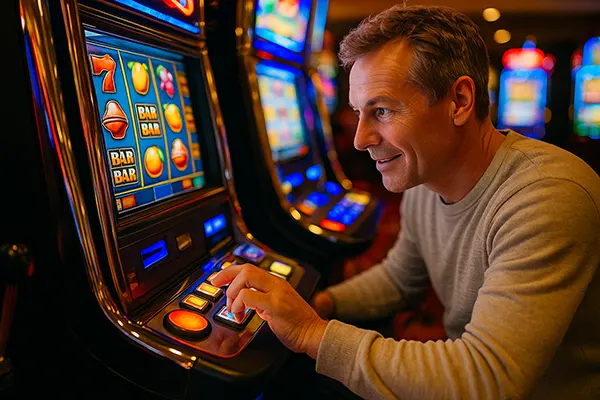
The Illusion of Control: Why Frequent Wins in Slots Don’t Mean Higher Jackpot Chances
Many players believe that frequent small wins in slot machines indicate they are getting closer to hitting the jackpot. In reality, this assumption is based on a cognitive bias known as the “illusion of control”. This phenomenon leads players to believe that they can influence random outcomes, especially when machines seem to reward them consistently with minor payouts. Understanding the mechanics of slots and the psychology behind them is crucial to avoiding financial and emotional pitfalls.
Understanding the Illusion of Control in Slot Machines
The illusion of control is a well-documented psychological concept, particularly relevant in gambling. It occurs when individuals believe they have influence over outcomes that are, in fact, purely random. In slot machines, this illusion is reinforced by frequent low-value wins and near-misses that give a false sense of progress or control.
Slot games are designed with algorithms that determine outcomes independently of past spins. Whether you win five times in a row or lose twenty, the next spin’s result is unaffected. Yet many players wrongly interpret patterns where there are none, leading to irrational betting behaviour.
This illusion is further strengthened by the game design: sounds, visuals, and the positioning of symbols. A near miss, where the jackpot symbol just lands one spot off, activates the same brain responses as a small win, misleading the player into thinking they are “getting closer”.
Why Frequent Wins Are Misleading
Frequent wins in slot machines are part of the reward system engineered to keep players engaged. These wins are often smaller than the bet amount and are programmed into the Return to Player (RTP) percentage. For example, a game might return 96% over time, mostly through small wins that do not significantly affect long-term profit or loss.
Players perceive this steady stream of small wins as progress, even when their total balance is decreasing. This is particularly effective when combined with autoplay features or turbo modes, where gameplay is accelerated, making losses less noticeable.
Moreover, jackpot triggers are often based on random number generators (RNGs), not on win frequency. This means that someone who just started playing has the same chance of winning the jackpot as someone who’s been playing for hours.
The Role of Random Number Generators and RTP
Slot outcomes are determined by RNGs, software that produces results independently for each spin. This technology ensures every result is statistically random, making it impossible to predict or influence the outcome, regardless of win frequency.
Each slot has an RTP figure that indicates the theoretical long-term payout. For example, a 95% RTP means that for every 100 credits wagered, the game is expected to return 95 over a long period. However, this does not mean every session will return 95%—it’s a statistical average calculated over millions of spins.
Understanding this helps players realise that there’s no “hot machine” or accumulation of chances. The machine does not remember previous spins, nor does it reward persistence with better odds. Every spin is a fresh, independent event.
Common Myths About Slot Winning Patterns
One popular belief is that machines “loosen up” after many losses, becoming more likely to pay out. This is false. The RNG doesn’t track game history or player activity. Such myths often originate from anecdotal experiences or gambler’s fallacies, not statistical facts.
Another myth is that betting more increases your chances of hitting a jackpot. While some progressive jackpots require maximum bets to qualify, increasing your wager doesn’t improve the odds—it only changes the potential reward if the improbable win occurs.
Also, changing machines frequently or staying on one for hours are both based on false assumptions. Since outcomes are random, neither strategy gives a mathematical edge. Believing otherwise is part of the illusion of control.

Responsible Gambling and Recognising Patterns
Recognising the illusion of control is a major step towards responsible gambling. Awareness helps players avoid impulsive decisions based on false patterns or the need to chase losses. Responsible play involves setting limits, understanding odds, and never betting more than one can afford to lose.
Tools such as session time limits, deposit caps, and self-exclusion options exist for a reason. They are designed to help players break free from the mental traps that gambling environments often exploit. Players should use these tools proactively to keep gameplay in check.
It’s also beneficial to approach slots as entertainment rather than income. The odds are always in favour of the house, and any win—small or large—is statistically an exception rather than the rule.
How to Avoid the Trap of Overconfidence
To avoid falling into the illusion of control, players should remind themselves of the randomness of each spin. Keeping track of time and money spent is crucial in maintaining a clear perspective on gameplay.
Taking regular breaks allows the mind to reset and reduces emotional responses that can cloud judgment. Logging session results—not just wins—can also highlight patterns of loss and encourage more rational decisions.
Finally, education is essential. Understanding how slots work, what RNG and RTP really mean, and the tricks used by game designers to keep players spinning helps develop a healthier, more informed approach to gambling.
